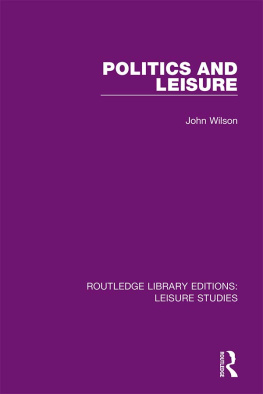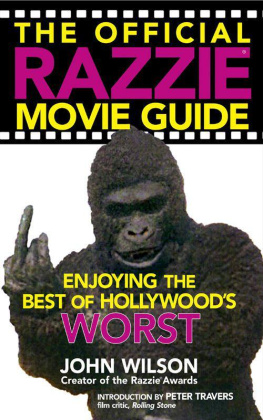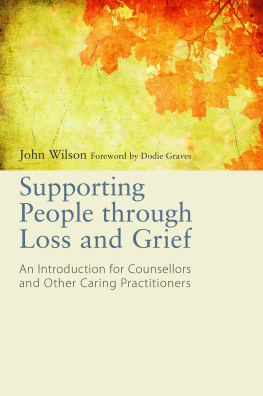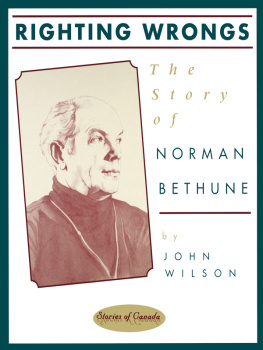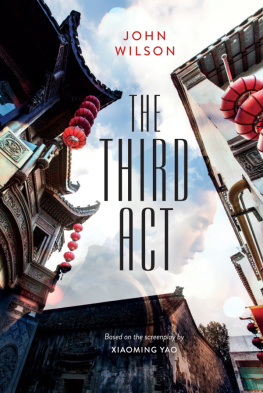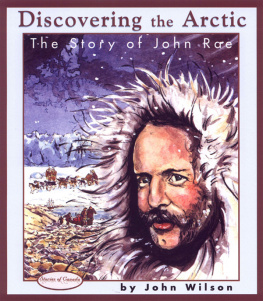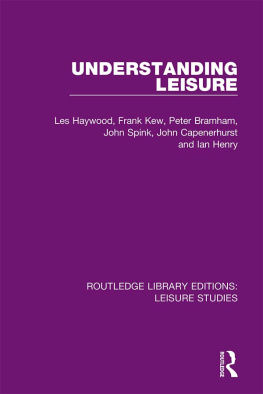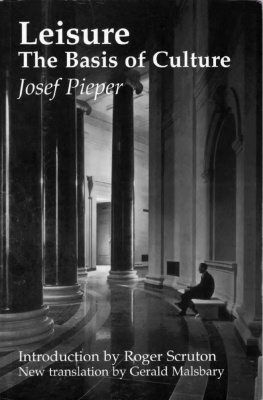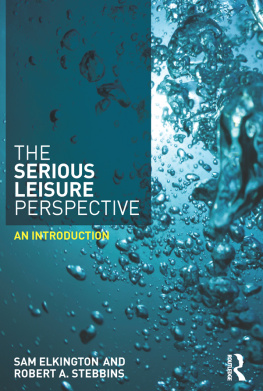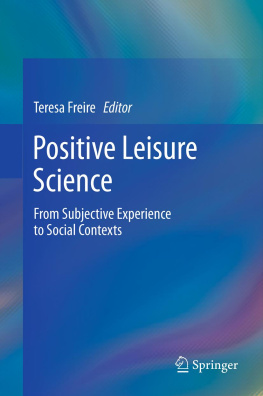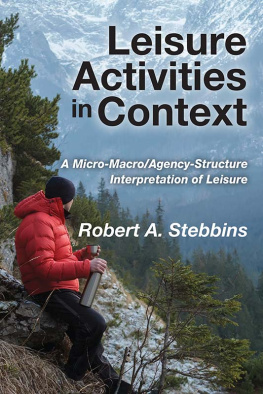ROUTLEDGE LIBRARY EDITIONS:
LEISURE STUDIES
Volume 12
POLITICS AND LEISURE
POLITICS AND LEISURE
JOHN WILSON
First published in 1988 by Unwin Hyman
This edition first published in 2019
by Routledge
2 Park Square, Milton Park, Abingdon, Oxon OX14 4RN
and by Routledge
52 Vanderbilt Avenue, New York, NY 10017
Routledge is an imprint of the Taylor & Francis Group, an informa business
1988 John Wilson
All rights reserved. No part of this book may be reprinted or reproduced or utilised in any form or by any electronic, mechanical, or other means, now known or hereafter invented, including photocopying and recording, or in any information storage or retrieval system, without permission in writing from the publishers.
Trademark notice: Product or corporate names may be trademarks or registered trademarks, and are used only for identification and explanation without intent to infringe.
British Library Cataloguing in Publication Data
A catalogue record for this book is available from the British Library
ISBN: 978-0-367-11036-9 (Set)
ISBN: 978-0-429-24268-7 (Set) (ebk)
ISBN: 978-0-367-11088-8 (Volume 12) (hbk)
ISBN: 978-0-429-02477-1 (Volume 12) (ebk)
Publishers Note
The publisher has gone to great lengths to ensure the quality of this reprint but points out that some imperfections in the original copies may be apparent.
Disclaimer
The publisher has made every effort to trace copyright holders and would welcome correspondence from those they have been unable to trace.
Politics and Leisure
John Wilson
John Wilson, 1988
This book is copyright under the Berne Convention. No reproduction without permission. All rights reserved.
Allen & Unwin, Inc.,
8 Winchester Place, Winchester, Mass. 01890, USA
Published by the Academic Division of
Unwin Hyman Ltd
1517 Broadwick Street, London W1V 1FP, UK
Allen & Unwin (Australia) Ltd,
8 Napier Street, North Sydney, NSW 2060, Australia
Allen & Unwin (New Zealand) Ltd in association with the
Port Nicholson Press Ltd,
60 Cambridge Terrace, Wellington, New Zealand
First published in 1988
Library of Congress Cataloging-in-Publication Data
Wilson, John, 1942
Politics and leisure/John Wilson.
p. cm.(Leisure and recreation studies: 5)
Bibliography: p.
Includes index.
ISBN 0-04-301265-5 (alk. paper). ISBN 0-04-301266-3 (pbk.: alk. paper)
1. Political science. 2. Leisure. I. Title. II. Series.
JA71.W465 1988
306.2dc19
8721154
CIP
British Library Cataloguing in Publication Data
Wilson, John, 1942
Politics and Leisure.
(Leisure and recreation studies; 5):
1. LeisurePolitical aspects
I. Title II. Series
306.48 GV14
ISBN 0-04-301265-5
ISBN 0-04-301266-3 Pbk
Set in 10 on 11 point Bembo by Columns of Reading
and printed in Great Britain by Billing and Son,
London and Worcester
In this opening chapter, I shall introduce the major concepts and ideas to be used in the book and explain how they will be used. Politics and leisure are words with deceptively obvious meanings. Actually each has many meanings, not only in everyday speech but also in the social sciences. I need to indicate how I shall be using them. A second problem is that we do not usually associate politics and leisure. Rather, we think of them as completely separate spheres. I therefore need to explain how they are related.
Leisure is notoriously difficult to define. Some sociologists treat it as a portion of ones time. Others regard it as a quality of experience unonfined to particular times. It is generally agreed that attempts to list all leisure activities do not help much, because almost any activity can be a leisure activity if the right attitude of mind is adopted toward it. Nor should we be misled by the enormous popularity of commercialized entertainment or the prestige of the high culture world of museums and galleries when trying to decide what leisure is. At the heart of most peoples leisure are informal and everyday things like playing with the children or pets, chatting with friends, pottering about in the garden, keeping one eye on the television, browsing in shops, or simply daydreaming. The more public part of the leisure worldtheme parks, vacation spots, cinemas, libraries, fairs, sports stadiums and playing fieldsare only the tip of the iceberg. Another difficulty in drawing a boundary around leisure is that much of our leisure occurs in the interstices of other social institutions; we might read a novel on the way to work, play squash on our lunch break, play with the children while taking the dog for a walk, gossip on our way to the shops, play softball with our church group. All this makes distinguishing leisure from other activities extremely difficult. Much overlapping and merging occurs, and much depends on the attitude taken toward an activity by the individual or group.
Leisure and Freedom
We should not abandon the attempt to define leisure simply because exceptions to any definition we agree upon will always be found. Leisure is essentially autotelic activity. In other words, it is chosen primarily for its own sake. If there are sanctions applied for failure to participate in a given activity, it is not leisure because it is not freely chosen (Lane, 1978, p. 149). Leisure is thus to be distinguished from whatever has to be done, it is voluntary, and the motivation is intrinsic. Of course, each of these elements in the definition is subject to modification in the real world. It is often impossible to decide what is absolutely necessary as opposed to something that is discretionary. For example, how clean does the car really have to be to prevent rust and deterioration? We can all agree that leisure must be free, but what kind of freedom do we have in mind? We must distinguish between freedom from compulsion (play is hardly something we can be forced to do) from freedom in the broader social and political sense. We can certainly define leisure as free in the first sense but it is not so clear that leisure could ever be free of social or political constraint. Specific leisure activities might be freely chosen, but the choice is always made within social and cultural constraints. For example, we can choose what we read, but not every kind of reading material is widely available. Finally, although we all have a fairly good idea of when we are doing something for its own sake, just for fun, much of what we do, such as jogging, contains both intrinsic and extrinsic motivations, and we ourselves are not sure where one begins and the other leaves off. None of these real world problems with our definition, however, should be allowed to obscure our view of the one essential and universal feature of leisure, that it is autotelic or instrinsically motivated. All people experience the two states of existence, one that asks no question of objectives beyond itself, the other that is stimulated and sustained by the goal that exists outside the behavior (Blanchard and Cheska, 1985, p. 40). No matter how much our free time becomes encrusted within activities which have some ulterior purposemilitary preparation, rehabilitation for work, childminding, impression-managementit will have at its core a leisurely component if it is energized and directed in part for its own sake. The desire to protect, reproduce and distill this essentially autotelic experience without at the same time sacrificing its spontaneity and freedom is part of the dialect of leisure.

